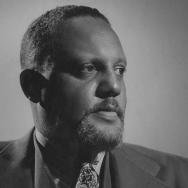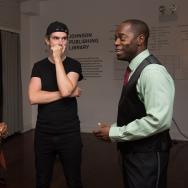Discovering the history of Black life in Chicago is vital to community members across the city and researchers around the globe, from families exploring their genealogy, to high schoolers participating in history fairs, to undergraduates writing class papers, and graduate students and faculty doing scholarly research.
A new online gateway to collection guides will make it easier for everyone to discover and use archival collections highlighting Black experiences at institutions across the Chicago area—including papers, photos, correspondence and more documenting the lives of people from Mahalia Jackson to Harold Washington, and organizations from the Chicago Urban League to the African Methodist Episcopal Church.
The BMRC Archives Portal has been developed by the Black Metropolis Research Consortium (BMRC), a Chicago-based membership association of libraries, universities, museums, community/arts organizations, and other archival institutions, with a home at the UChicago Library. The BMRC’s mission is to connect all who seek to document, share, understand and preserve Black experiences.
“Researchers can use the portal as a tool to find the collections, voices and stories that are essential to our history, to the stories we're writing now,” said Marcia Walker-McWilliams, executive director of the Black Metropolis Research Consortium. “The Portal can help illustrate and illuminate new connections in the lives and projects documented in the archives. We invite you to explore the broad landscape of the intertwined histories of Black experiences in Chicago and beyond.”
Portal Features
- Do a single search across multiple institutions: Use one search box to locate relevant guides to archival collections in institutions across the Chicagoland area.
- Learn from descriptive narratives about collections: Learn about Black history and culture by browsing a category and reviewing available narratives. Archival collection guides usually include detailed biographical and organizational histories.
- Interactively refine or broaden searches: Refine results by topics, people, organizations, places, and decades. Find out which archives are represented in the BMRC Archives Portal and look at all the holdings at one institution.
- For new or young researchers: Avoid dead ends and overly broad keywords with BMRC Curated Topics—a guided search that is guaranteed to provide rich results. Students can get inspired by featured search terms on the home page. Quarterly digital exhibits will offer more in-depth information and media on a selected category.
Collection guides focus on the holdings of member institutions, including the Chicago History Museum, Chicago Public Library, Chicago State University, Columbia College Chicago, Cook County Archives and Records Office, DePaul University, Dominican University, DuSable Museum of African American History, Illinois Institute of Technology, Loyola University Chicago, Newberry Library, Northern Illinois University, North Park University, Northwestern University, Oak Park Public Library, Rebuild Foundation, Roosevelt University, Shorefront Legacy Center, South Side Community Art Center, University of Chicago, and University of Illinois at Chicago. Supplemented by information about other repositories, the BMRC Archives Portal will serve as a unique treasure trove for the study of Black history and culture.
“The University of Chicago Library is invested in collaborations like this one that expand knowledge throughout the community, especially those that value and increase an understanding of diversity and its role in the rich and complex history of our city. It is so important to the University of Chicago Library that we can activate our collections for so many different kinds of audiences—from scholars to community members to K-12 audiences,” said Elisabeth Long, interim director and University Librarian. “We also believe the future of libraries is thinking of our collections together with those of others. By collaborating with institutions across the region we are able to build a portal that focuses on what Chicagoans and scholars need, not just on what we own. I am pleased we could also leverage the Library’s technical expertise to help build this portal.”
The Black Metropolis Research Consortium Archives Portal is an initiative under the BMRC’s “Documenting Black Chicago through Technology, Sustainability and Outreach” grant, made possible with funding from the Andrew W. Mellon Foundation.
“Increasing knowledge of and access to historical collections on Black experiences in the Chicagoland area is a key part of the BMRC’s mission,” said Walker-McWilliams. “We believe that the BMRC Archives Portal is a significant step forward in achieving this goal, and we are grateful to the Andrew W. Mellon Foundation for funding this work.”
This Portal is a culmination of the work of four different archives projects—two at the BMRC, and two from the University of Chicago, now accessible in one online space. The launch of the portal follows nearly two years of planning, testing and implementation led by BMRC Portal Archivist, Laurie Lee Moses, with support from multiple team members in the Digital Library Development Center at the University of Chicago Library, including John Jung.

